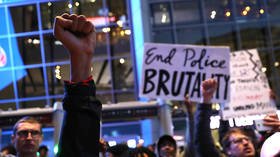‘Shoot first, think later’: Obscure US law INCREASINGLY helps police officers to get away with using excessive force

US courts have been heavily relying on a 50-year-old legal loophole to shield cops from misconduct allegations, an investigation by Reuters claims. It allows officers to get off the hook even when their conduct is deemed unlawful.
The share of civil rights cases, in which courts resort to a controversial legal doctrine to shield officers from allegations of using excessive force, has been increasing in recent years, Reuters has claimed in its new investigative report. The report draws on data from 529 federal circuit court rulings published between 2005 and 2019 on appeals in the lawsuits where so-called “qualified immunity” was invoked in a bid to protect police.
Also on rt.com NYPD officers caught in shocking VIDEO brutalizing unarmed black man for unspecified 'crime'The statistics have shown that police celebrated victory in 56 percent of such cases from 2017 through 2019 – an increase of seven percent from the three years before, when courts sided with defendants some 43 percent of the time.
In ”more than three dozen” of the cases studied, officers would avoid responsibility even after their actions were deemed unlawful, including in a bizarre case of a mistaken identity that saw police “accidentally” killing a cyclist by firing 17 rounds at him.
In other instances, the concept of “qualified immunity” allowed police to get away with fatally shooting, tasering, choking, and body-slamming unarmed people, including those suffering from mental issues.
In one particularly disturbing case cited by Reuters, police were called to a hospital to help staff subdue a pneumonia patient so they could administer him with a tranquilizer. When the deputies arrived, however, they allegedly shocked the man more than a dozen times with stun guns and hogtied him on the floor. The showdown has been blamed for exacerbating the man’s breathing problems and ultimately leading to his death due to “respiratory insufficiency.” The man's mother sued the police but lost the case.
The qualified immunity rule was designed by the US Supreme Court five decades ago to protect government employees from frivolous lawsuits. Before 2009, a court had two questions to look into when considering such immunity: the first one is whether officers violated the Fourth Amendment to the US Constitution; and the second one is whether the laws they have been accused of breaking were “clearly established” at the time when the incident took place.
Also on rt.com Protesters storm New York subway & vandalize stations in heated anti-police demonstration (PHOTOS & VIDEOS)Since 2009, the Supreme Court has allowed appellate courts to skip the first question entirely. At the same time, the term “clearly established” has a very narrow definition in the US law, which effectively means that unless there is a precedent with very similar circumstances to the case heard, officers will more than likely than not get off scot-free, according to the report.
The use of qualified immunity has drawn criticism in the past, including within the Supreme Court. In a 2018, Justices Sonia Sotomayor and Ruth Bader Ginsburg argued that the reliance on the said rule sends an “alarming signal” to police officers, telling them that “they can shoot first and think later” and “will go unpunished.”
That same year, writing in the Georgetown Journal of Law and Public Policy, legal scholar Evan Bernick urged courts to limit the application of qualified immunity, stressing that the rule is “neither” good law nor good policy, as it “imposes heavy costs” on the victims of official misconduct.
Think your friends would be interested? Share this story!














